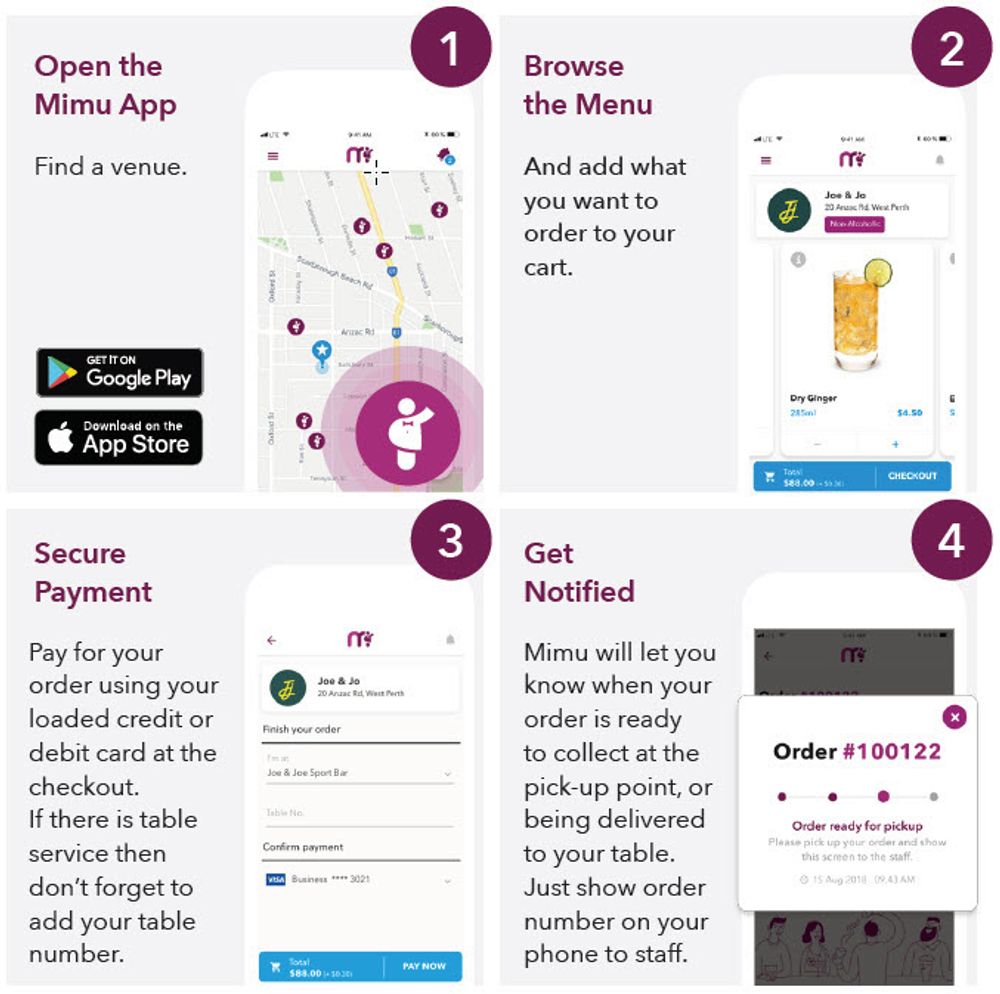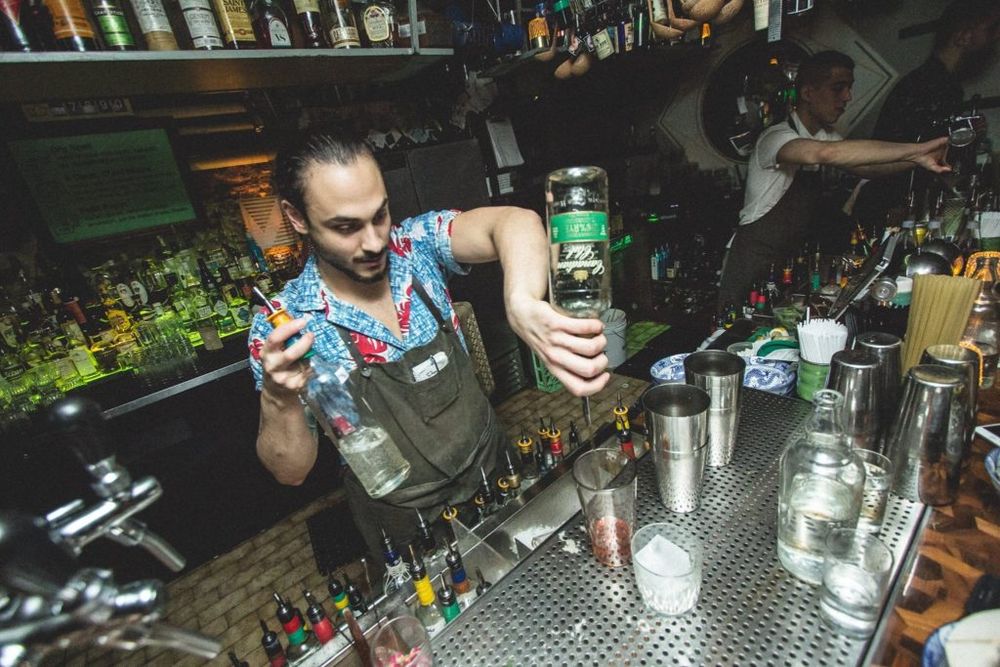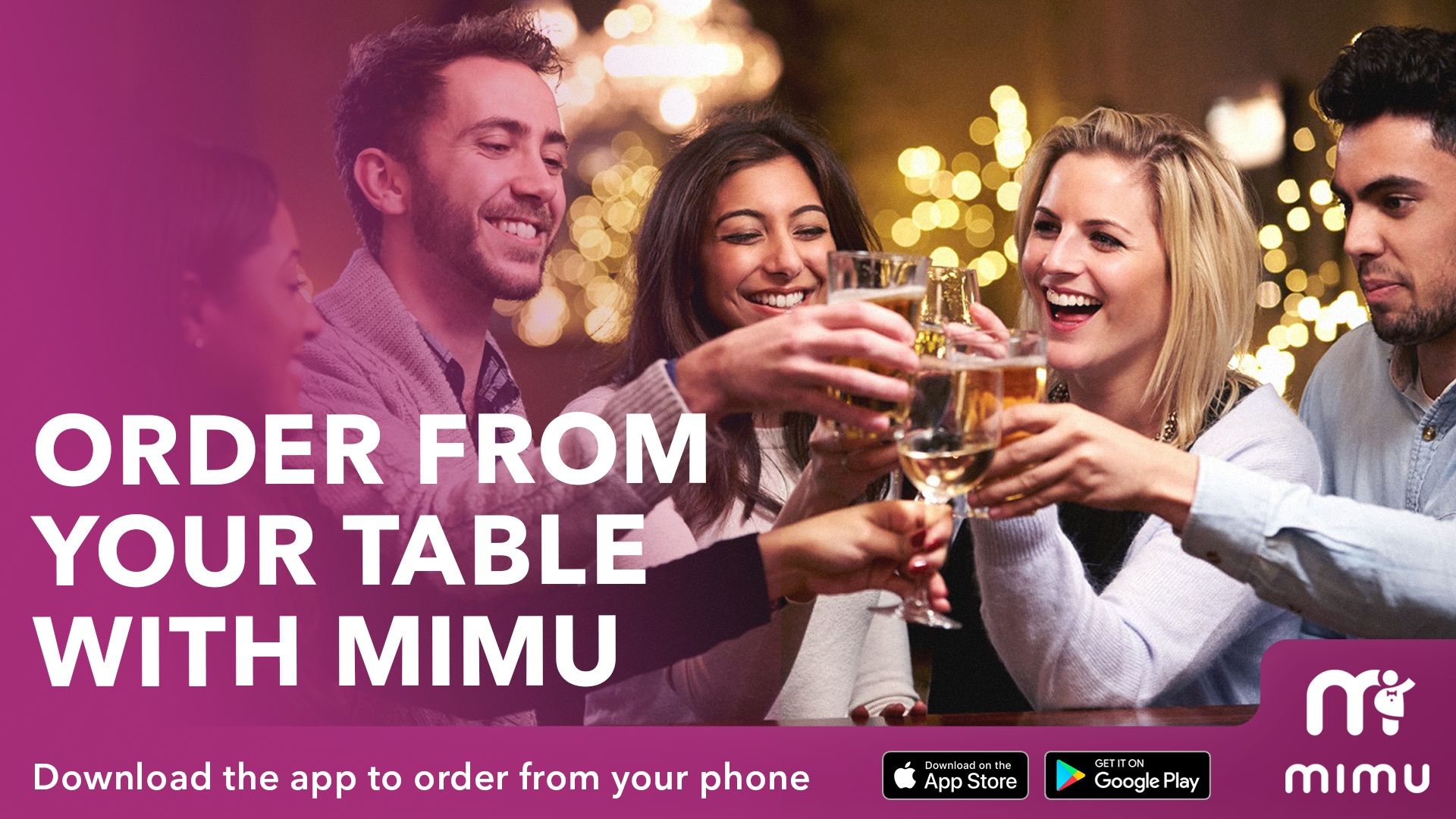Every bar, pub and restaurant will have to find the right contactless ordering and payment apps and support services. Mimu is already showing what can be done in Australia.
Considering the vast changes that have taken place in the last two months in the way we shop and go about our daily lives, coming to the market with a new delivery, click and collect and contactless payment app seems more opportunistic than innovative.
But when Andrew Jones, a former Diageo and AB InBev regional manager in Australia, first came up with the idea of his delivery and payment app at the beginning of 2019, nobody in the world had even heard of Covid-19 and social distancing was about being polite than a health risk.
Having spent 25 years trying to sell major drinks brands into restaurants, pubs bars and retailers across Australia, his inspiration was more about developing a tool that would help brand owners and on-trade operators better understand what products are being sold in what outlets and why.
What he has now developed, under the Mimu name, is an app that is uncannily fine tuned to the unique Covid-19 related needs of the drinks, hospitality and retail sectors all rolled into one. A platform that can create micro sites for thousands of operators to post up their drinks lists and food menus and then promote them either for delivery or click or collect, and then once outlets are open, allow them to do 100% contactless ordering and payment via a person’s smartphone sitting safely at a table. But that’s only part of it. More of that later.
The initial idea

The Mimu app can be used for delivery and also a contactless payment and ordering app and to analyse bar trends and drinks data
The idea, he says, actually came from his brother-in-law when they were out having a drink and talking about the frustration of having to step away from your mates’ conversation and fight to be served at a busy bar.
“Wouldn’t it be great if we had an app that could remember everyone’s orders and allow us to do it all from our phone?” he recalls.
Now such technology and apps have been around for some time. Wetherspoons has built its reputation amongst younger drinkers, in particular, not just for his cheap drinks, but because it allows you to do all your ordering and paying through its own app.
Where they are now coming into their own is due to the explosion in online ordering and the need for technology to come to the aid of so many bars and restaurants that are looking to get cash flow running through their businesses by running some sort of click and collect or delivery service.
As the on-trade and hospitality sectors move towards pro-actively thinking about how they are going to start re-opening outlets the need for contactless technology is going to be vital.
The Buyer last month shared Capgemini’s research that showed over 75% of consumers would want to see contactless ordering and payments systems in place for them to even consider going into an on-trade outlet. That figure is only likely to go up as more bars and restaurants do open.
It’s all about the data and insights

Mimu is now looking to work with on-trade groups in the UK
That’s where Jones believes Mimu can really prove its worth to any outlet and its suppliers as it not only provides all the ordering and payment processes you need, but it can also be used as part of your marketing strategy to promote certain drinks, run discounts and loyalty schemes and make the app part of someone’s hospitality experience when in that outlet.
He admits the initial trials for Mimu were slow and that many drinks-led operators and bars could not really see the added value of allowing their customers to simply sit at their table and order drinks.
But slowly the penny started to drop that this was as much about improving the experience of your customers whilst in your bar. It allows them to stay in their conversations, sitting at the table whilst their drinks are brought to them.
Jones says he has been slowly building up the app’s presence and visibility in Australia and was all set to go live with another 12 to 13 more venues through the Australian Liquor Marketers when the pandemic struck.
“Rather than sit on our hands we have further developed the app to do takeaway and delivery as well,” says Jones.
In order to keep things quick and simple it has also made and designed standard templates for each operator to load their menus and personalise with their own logos and pictures.
“We want this one app to be able to everything,” adds Jones, referring to the many other competing apps that are already in the market, with many more, no doubt, set to follow. “Mimu can be one app that covers all your needs and only requires you to download your credit card details once,” he adds. “All of a sudden no contact ordering and payment is top of the agenda. Anything that can help with social distancing.”
This sort of app helps drive three revenue streams for on-trade outlets: in venue; delivery; and pick up.
Understand and push your drinks sales better
But coming from a drinks brands background also means Jones sees the app becoming a fully integrated part of a brand owner’s sales and marketing division.
For it has been designed to help operators and brand owners to push certain products through its home page with discounts and loyalty schemes. And then use the app’s analytics to analyse what spending behaviour triggers changes between ordering beers, wines and spirits.
As Jones says being able to influence consumers, through a payment app, to switch from a beer to a spirit or a wine, just one drink earlier in a session, could increase these categories by millions of pounds. Data that can also show differences in what influences men and women drinkers by age group, price point and time of purchase.

By promoting Canadian Club through the app bars in Australia were able to increase its sales during promotion and long after, says Jones
Trials in Australia show how brands can use these apps to transform their sales and knowledge of what works in certain outlets. Canadian Club, for example, went from just 1.5% of sales in one busy bar to one in five drinks served on a particular night when its price was dropped from A$11 to A$9 and it was the main promotion on the app. When the promotion was removed it was still making up 13% of sales.
By tracking previous orders, these apps, in time will be able to spot trends between the drinks and food people order, and what might have prompted them to trade up or buy another drink.
“The power of that data and what it can tell you about how certain brands are performing in particular outlets is incredible,” claims Jones.
He stresses the app would not break down the data to identify any particular individual and will be more macro segmentation that allows operators and suppliers alike to see who is using it, by gender, and the triggers that influence changing in spending behaviour. Be it price, the tyre of discount and advertising used. “It’s potentially incredibly powerful,” he says.
Data mining bar and restaurant orders
It will also allow outlets to break down the data by day and time of day and plot spikes in demand and when it potentially needs to have more staff. “All that data is at our fingerprints. The data we have can potentially influence the consumer, and supplier activity and promotions.”
He is already working with Asahi and Peroni in Australia to see what they can learn and is keen to tie up with other drinks suppliers and wine brands to see how the app can influence purchasing behaviour.

Richard Siddle chats through the Mimu app with founder Andrew Jones, top left, and his UK business partner David Otter
It potentially provides both outlets and brand owners far more visibility and understanding of what has actually been bought and sold, but most of all why, he adds.
Customers could even use it to pay for the drinks of a friend or family member who has out having a drink in another part of the world. Or arrange to have a bottle of Champagne presented to a friend when they are out having a meal.
Jones is confident the shift in consumer behaviour is here to stay and that these sort of apps are going to be as disruptive as the likes of Deliveroo and Uber that came before them. “We can tie a loyalty programme into the app so that consumers can be rewarded the more times they use it in different outlets.”
How much does it cost?
So how does he make it pay its way? The idea, he stresses, is to get away from the 30-35% fees that apps such as Deliveroo charge operators.
“We are not about profit erosion for our customers,” he adds.
Instead costs will be structured around a monthly subscription which will depend on how many items you have on your menu, but should average out at around A$150 a month. Which also includes the use of your own venue data. Any operator can be set up within 24 hours, adds Jones.
Alternatively Mimu can set up and provide the data in whatever segment or format they require. “We can cut and splice the data in any way they like,” he adds.
From a consumer point of view they have so far been charged 30 cents on top of their purchase which has not been an issue to date.
The app is being targeted initially at the on-trade and those doing delivery, but can be expanded to cover different segments like wineries, distilleries and craft brewers.
“We have also been approached by businesses outside hospitality, including a dog food producer and someone who wants to use Mimu for air conditioning parts. We are also happy to look at white label opportunities as well where we can work together with other companies.”
As for the name? Mimu apparently is the name for drink in Yoruba, the language common in West Africa. So there you know.
- If you would like to know more about how the app works then you can contact Andrew Jones at aj@mimu.com.au or David Otter in the UK on david.otter@mimu.com.au.










































